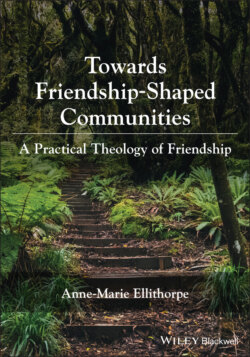Читать книгу Towards Friendship-Shaped Communities: A Practical Theology of Friendship - Anne-Marie Ellithorpe - Страница 15
Part I: The Current Reality
ОглавлениеDescriptive theology considers underlying norms and metaphors and seeks to capture and clarify practical questions. This phase is not simply the realm of the social sciences. Rather, questions emerging from the descriptive task are drawn from a variety of disciplines, including theology. While various disciplines help develop a thick description of an issue, each carries its own implicit and explicit norms and must be incorporated critically.72 Browning suggests that questions such as the following guide this movement of theological reflection: “What, within a particular area of practice, are we actually doing? What reasons, ideals, and symbols do we use to interpret what we are doing? What do we consider to be the sources of authority and legitimation for what we do?”73 Reflection on these questions encourages us to in turn consider what we really should be doing, reflect on the accuracy and legitimacy of our sources, and consider why dominant understandings prevail.
Thus, I seek to name the way things are with two descriptive chapters. Many of the conversation partners within this stage will be re-engaged with in subsequent stages of this research. Chapter 1 considers ways in which friendship is defined, understood, and lived out, drawing on writings from the twentieth and early twenty-first centuries, and identifies key questions concerning the nature and status of friendship. Chapter 2 considers various forms of relationality and friendship within Aotearoa New Zealand, paying particular attention to Māori expressions of relatedness, power dynamics in Aotearoa, and the impact of both on the possibility of friendships between Māori and settlers. This chapter also examines the contemporary coexistence of varying friendship worlds and considers various forms of relationality and friendship within, as well as beyond, one colonized country. Key to this consideration are holistic multidimensional Indigenous understandings of relationality, the signing and subsequent dishonoring of a treaty during the nineteenth century, resistance to colonization and the loss of land, and various forms of friendship throughout. This includes a certain amount of storytelling.
Why prioritize identifying the relational perspectives of an Indigenous minority in a far-flung part of the globe? I am convinced that a practical theology of friendship must include Indigenous perspectives and grapple with issues of power and colonization. Indigenous traditions are wisdom traditions. Indigenous peoples recognize the cosmic dimensions of relationality and are committed to right-relatedness and harmony. Westerners have much to learn about relationality and right-relatedness from a breadth of Indigenous perspectives, given the value that Indigenous peoples place on relationships.
Why focus most specifically on Māori perspectives? I have been privileged to learn from the wisdom of Māori leaders, authors, and friends, and am convinced that Māori theology and practice has much to offer as a conversation partner within practical theology. I lament the distorted social imagination that led to the dishonoring of the 1840 Te Tiriti o Waitangi between Māori and the British Crown and the subsequent oppression of te tangata whenua (the people of the land). I am grateful for the gifts of wisdom, hospitality, friendship, and mentoring I have received from Māori, and for the encouragement that this work is relevant to church and nation(s).
